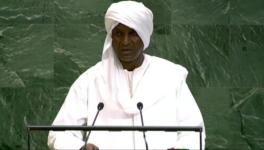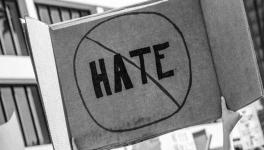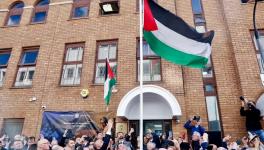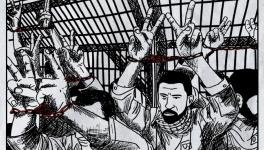War Crimes in Sri Lanka - UN Panel demands accountability
Spokesperson of the Sri Lanka Democracy Forum, Ahilan Kadirgamar talks to Newsclick over phone from New York. He argues that the "Report of the Secretary-General's Panel of Experts on Accountability in Sri Lanka" brings about valid recommendations, which if heeded by the otherwise triumphalist and denialist Sri Lankan government could pave the way for true reconciliation and accountability in Sri Lanka following the brutal civil war in 2009.
Srinivasan Ramani (Newsclick) - Hello and welcome to Newsclick. We have with us over telephone, Mr. Ahilan Kadirgamar, spokesperson for the Srilankan Democracy Forum and with whom, we shall discuss the implications and reactions to the Report of the UN secretary General's panel of experts on accountability in Sri Lanka. Ahilan, welcome to Newsclick. Ahilan Kadirgamar (AK) - Thank you Srinivasan.
Newsclick - Critics of both the Sri Lankan government and the LTTE such as yourself have for long argued for justice for the victims of the long civil war in Sri Lanka and for immediately addressing the issues concerning minorities. This seems to have been ignored by the triumphalist Sri Lankan government if you can say so. So do you feel vindicated by the UN report's findings, and recommendations?
AK - The UN panel report is, in fact, a very robust report. But the first point is that this is not investigative panel, only an advisory panel to the Secretary-General. And in their report they have come out with many recommendations. Chief among them is that the Sri Lankan government should carry forward investigations into alleged human rights abuses. They believe that they have credible evidence of alleged war crimes by both – the Sri Lankan government and the LTTE, the Sri Lankan government forces and the LTTE. But the first of all they want the Sri Lankan government to carry out investigations and they believe that UN can have a role in monitoring. Now as everyone knows that the last phase of war, which this report addresses, was a very brutal phase and estimates vary from 7000 upto tens of thousands of people who were killed including most of them… civilians. So they made these very strong recommendations. Now, it's been two years since the end of the war and the worry among many democracy activists inside Sri Lanka is that there hasn't been much progress at all on the issue of accountability and reconciliation. And in that context this report is indeed very important in terms of restarting again the discussion on the need for accountability and reconciliation. I think this is extremely important in terms of what Sri Lanka's post war future is going to look like.
Newsclick - The Sri Lankan government's response on the other hand has been a mixture of denial and outrage at the attempts by the UN to impinge on what it calls "sovereignty". So in a sense, the reaction is also quite tragic.
AK - Now, this sovereignty argument has, I think,many sides to it. On the one hand it is true that historically third world sovereignty and the sovereignty of small states like Sri Lanka do get interfered with by larger powers. There's no question about that. And as many actors inside Sri Lanka argue it'll be much harder for the Secretary-General, for example, to have a similar panel on Iraq or Afghanistan. On the other hand what does this sovereignty really mean for the people of Sri Lanka or is it only about defending a regime or consolidating the Rajapaksa regime? I think that is the important question here. Unfortunately I think not only in Sri Lanka, but in many states over the last few decades, particularly after the end of the Bandung era, third world sovereignty and national security have been arguments that had been used to strengthen or entrench repressive regimes. Now the External Affairs Minister, G.L. Peiris, went so far as to say that the U.N. panel report should not be published…That it could, in fact, strengthen extremists inside the country…That it will open up wounds that have started to heal. These have been the arguments of the Sri Lankan government. But I would argue that it is actually the Sri Lankan government that has been giving centre stage to Sinhala nationalists; they have been brewing xenophobia, jingoism and nationalist sentiments inside the country. While they condemn the West for interfering in the sovereignty, they use often the same language that the Bush regime used of the war on terror and phrases like ‘if you are not with us you are against us’. That that sort of mentality also continues in Sri Lanka. While mentioning this argument of sovereignty, Sri Lanka in the last three years has been floating a number of sovereign bonds. That is ironic. When it comes to the economic front the last budget for example much of it has been about opening up Sri Lanka's financial markets to global capital. So there are contradictions in the way in which they're using this sovereignty argument.
Newsclick - So at one level domestically, the Sri Lankan regime or government is trying to whip up nationalism to paper over concerns about what it did during the civil war, and externally it seems that Sri Lankan government is using geopolitics, diplomacy to curry support for its position vis-a-vis the U.N. Recently, G.L. Peiris has been to Delhi, and also Beijing. What do you make of the Indian and Chinese governments’ response to these diplomatic moves?
AK - Within Sri Lanka whipping up nationalism has been very helpful for the current government and the consolidation of the regime. Militarisation and consolidation of the power domestically has whipped along this kind of reaction to the U.N. Panel. Now, externally, I think the Sri Lankan government is worried; the Human Rights Council sessions may bring this up in the near future. They're concerned that this will be brought up in international fora and in that context the External Affairs Minister G.L. Peiris was in India two weeks ago. The May 17th joint statement is quite revealing. When it comes to India, certainly there have been very strong reactions inside Sri Lanka to it. At least from the joint statement it seems like there might be some kind of shift in India's engagement with Sri Lanka. Apropos the joint statement issues such as lack of movement in terms of the political process and devolution have been brought up. There have also been calls on Sri Lanka to end the state of Emergency, to move on genuine reconciliation and address the concerns of the displaced and that of resettlement. And the Sri Lankan government’s strategy over the last few years has been to balance India with engagement with China. So soon after the External Affairs Minister's visit to India he was in China and China actually has been much more vocal that Sri Lanka can address its own problems and there is no need for a UN probe. Now in the near term both India's role and China's role is going to be significant as the UN's role develops in Sri Lanka. In fact within two weeks after the end of the war there were two important developments back in May-June 2009. One, the UN Secretary-General visited Sri Lanka a few days after the end of the war and came out with a joint statement with the President from which he draws his mandate because in that joint statement the UN Secretary-General, Ban Ki-moon and President Rajapaksa said that Sri Lanka will address the concerns of accountability and reconciliation and lack of movement. That was what the Secretary-General used as a point to initiate this particular advisory panel. The second important thing within weeks after the end of the war was a UN Human Rights Council resolution. While the European Union and other countries wanted a resolution that condemned the conduct of Sri Lanka's approach to the war, many of the Asian powers including India and China turned that resolution more or less into one congratulating Sri Lanka on ending the war and one of their recommendations for advisors of the UN panel report is that the UN Human Rights Council should reconsider that resolution. I think that that is of serious concern to Sri Lanka and in that context I think there will be lot of diplomatic moves made, there have already been number of moves made and possibly in the future as well.
Newsclick - Let's turn our attention towards the Tamil diaspora. Sections of the Tamil diaspora always maintained that actions during the last phases of civil were close to, or even should be defined as, genocide. While they have reacted with some amount of fervour to the UN panel report on what they claim to be actions by the Lankan armed forces, they have been conspicuously silent on the actions by the LTTE themselves. So, things like the LTTE using Tamil people as human shields, illegally conscripting them, making them dig trenches, so on and so forth. So has the diaspora really learnt its lessons at all following the defeat of the LTTE?
AK - The role of the diaspora and the diaspora is not monolithic. There are different sections within the diaspora but the most mobilised sections of the diaspora have been very problematic. Over the last 25 years they gave unconditional support to the LTTE and on the other hand the LTTE also used intimidation to control the diaspora. They worked more or less like a mafia in controlling large sections of the diaspora forcefully, also collecting the funds for their war chest. So these mobilised sections of the diaspora have used the word genocide to describe what's going on in Sri Lanka. I would actually disagree with that characterisation. There may have been war crimes that might have been committed but it's not genocide because in Sri Lanka we have a long history of strong ethnic relations with Sinhala and Tamil community. These communities, as well as Muslim community which is really talked of outside, have lived side by side. Now the war did, to some extent, polarised these communities and that's why there needs to be a process of the reconciliation. But what happened was not genocide and the UN panel report is also careful not to use the language of genocide because I think there is a possibility of a future where all these communities can live together and they would be very careful about the language that is used to describe the situation in Sri Lanka. Now, towards the end of the war, it was a very brutal end as we all know, and severe human rights abuses were committed by both parties to the war – the Sri Lankan government as well as the LTTE. Some would argue that the LTTE should even take more responsibility because, more or less, they held this large population, close to 3,00,000 people, as hostages, as human shields. People who tried to flee were shot by the LTTE. So a number of people were killed and the LTTE really took the Tamil community on a suicidal path. Unfortunately even now that introspection, that critical reflection is not happening adequately within the larger diaspora. Though, with the end of the LTTE, space is starting to open up. The diasporic forces are starting to fracture. I think more democratically minded forces have started to emerge and I think the younger generation is also beginning to change. So these are positive developments but I think it's going to take time. The unfortunate thing in terms of the reaction to the UN panel report is – I always say that the Sinhala nationalists and Tamil nationalists, within the country or in the diaspora, are objective allies – they need each other to reinforce each other and they have been saying the same thing with respect to the UN panel report. The Sinhala nationalists, and even the government to some extent, claims the this UN panel report has been lobbied by and is a creation of the pro-LTTE sections of the diaspora which is obviously not true because the UN panel report is extremely critical of the LTTE but they never highlight that. The Sri Lankan government never highlights the fact that the UN Panel report has been very critical of the LTTE. On the other hand, the pro-LTTE sections of the diaspora have also been silent about the LTTE abuses, its war crimes committed, that are alleged in this particular report. So, I think there needs to be a serious critical reflection broadly in the diaspora and the broad diaspora should not play any negative role in the reconciliation and a different future in Sri Lanka.
Get the latest reports & analysis with people's perspective on Protests, movements & deep analytical videos, discussions of the current affairs in your Telegram app. Subscribe to NewsClick's Telegram channel & get Real-Time updates on stories, as they get published on our website.
























